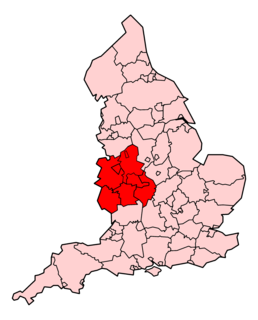Related Research Articles
Strategic health authorities (SHA) were part of the structure of the National Health Service in England between 2002 and 2013. Each SHA was responsible for managing performance, enacting directives and implementing health policy as required by the Department of Health at a regional level.
NHS Direct was the health advice and information service provided by the National Health Service (NHS), established in March 1998. The nurse-led telephone information service provided residents and visitors in England with healthcare advice 24 hours a day, every day of the year through telephone contact on the national non-geographic 0845 46 47 number. The programme also provided a web based symptom checkers on the NHS Direct website and via mobile, both as apps for iPhone and Android smart phones and a mobile website.

The University Hospitals Birmingham NHS Foundation Trust provides adult district general hospital services for Birmingham as well as specialist treatments for the West Midlands.

The West Midlands Ambulance Service University NHS Foundation Trust (WMAS) is the second-largest ambulance service, and the first university ambulance trust in the UK. It is the authority responsible for providing NHS ambulance services within the West Midlands region of England. It is one of ten ambulance trusts providing England with emergency medical services, and is part of the National Health Service. There is no charge to patients for use of the service.
Practice-Based Commissioning (PBC) was a United Kingdom Department of Health initiative introduced in 2005 to improve primary care services by enabling healthcare professionals to decide how services are funded to meet the needs of the local population. PBC was designed to give healthcare staff, usually general medical practitioners (GPs), the resources and support to become directly involved in decisions on commissioning health services.
NHS West Midlands was a strategic health authority (SHA) of the National Health Service in England. It operated in the West Midlands region, which is coterminous with the local government office region. It was abolished in April 2013.

Clinical commissioning groups (CCGs) are NHS organisations set up by the Health and Social Care Act 2012 to organise the delivery of NHS services in England. The announcement that GPs would take over this commissioning role was made in the 2010 white paper "Equity and Excellence: Liberating the NHS". This was part of the government's stated desire to create a clinically-driven commissioning system that was more sensitive to the needs of patients. The 2010 white paper became law under the Health and Social Care Act 2012 in March 2012. At the end of March 2013 there were 211 CCGs.
Dudley and Walsall Mental Health Partnership NHS Trust was an NHS trust set up in October 2008. It provides mental health services across Dudley and Walsall, West Midlands, England. It runs Dorothy Pattison Hospital and Bloxwich Hospital in Walsall, and Bushey Fields Hospital in Dudley.
Heart of England NHS Foundation Trust (HEFT) was one of the largest organisations running NHS hospitals in England. The hospitals and services run by HEFT included Heartlands Hospital, Solihull Hospital and Community Services, Good Hope Hospital in Sutton Coldfield and Birmingham Chest Clinic. The trust was under the leadership of chair Jacqui Smith and chief executive David Rosser, who succeeded Julie Moore on 1 September 2018.
Out-of-hours services are the arrangements to provide access to healthcare at times when General Practitioner surgeries are closed; in the United Kingdom this is normally between 6.30pm and 8am, at weekends, at Bank Holidays and sometimes if the practice is closed for educational sessions.
Healthcare in London, which consumes about a fifth of the NHS budget in England, is in many respects distinct from that in the rest of the United Kingdom, or England.
The Five Year Forward View was produced by NHS England in October 2014 under the leadership of Simon Stevens as a planning document.
Healthcare in Worcestershire is now the responsibility of three Clinical Commissioning Groups, covering, respectively Redditch and Bromsgrove, Wyre Forest and South Worcestershire.
Healthcare in Sussex was the responsibility of seven Clinical Commissioning Groups covering: Brighton and Hove; Coastal West Sussex; Horsham and Mid Sussex; Crawley; Eastbourne Hailsham and Seaford; Hastings and Rother; High Weald; and Lewes-Havens from 2013 to 2020. From April 2020 they will be merged into three covering East Sussex, West Sussex, and Brighton and Hove.
Healthcare in Staffordshire is now the responsibility of six clinical commissioning groups, covering: Stafford & Surrounds; North Staffordshire; South East Staffordshire and Seisdon Peninsula; East Staffordshire; Cannock Chase; Stoke-on-Trent.
Healthcare in the West Midlands is now the responsibility of five clinical commissioning groups (CCG): Birmingham and Solihull; Sandwell and West Birmingham; Dudley; Wolverhampton; and Walsall.
Healthcare in Surrey was the responsibility of 5 Clinical Commissioning Groups: East Surrey, North West Surrey, Surrey Downs, Guildford and Waverley, and Surrey Heath from 2013 to 2020 when East Surrey, North West Surrey, Surrey Downs, Guildford and Waverley merged to form Surrey Heartlands CCG. the new organisation started with a £62 million deficit.
Healthcare in Leicestershire is now the responsibility of three clinical commissioning groups covering West Leicestershire, Leicester City and East Leicestershire and Rutland. As far as the NHS is concerned Rutland is generally treated as part of Leicestershire.

Professor Nick Harding OBE BSc FRCGP FRCP HonMFPH DRCOG DOccMed PGDIP(Cardiology) SFFLM, born 21 December 1969, is a British general practitioner and Chief Medical Officer at Operose Health.
References
- ↑ Lord-Lieutenant for the West Midlands Archived 14 October 2009 at the Wayback Machine , 23 August 2007
- ↑ Senior, Kathryn (October 2009). "Preventing hospital visits through telemedicine". Bulletin of the World Health Organization. 87 (10). pp. 733–804. Retrieved 9 October 2009.
- ↑ "Chubby nurses to be offered cash incentives to lose weight at work". The Mirror (London, England). 14 July 2008. Retrieved 9 October 2009.